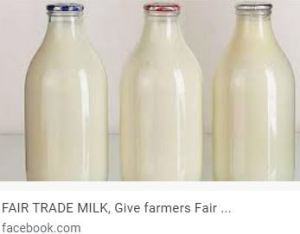“It is simply not right that any worker should have to sell their product for less than it costs them to produce them, and this is acutely felt by dairy farmers.”
 Countryfile, reviewing Jeremy Corbyn’s “Rural Renewal” report, continued to quote: “A combination of a small number of very large milk processers operating as suppliers to retailers, supermarkets operating a ‘price war’ forcing down the cost of milk, and milk co-ops losing their power has resulted in thousands of dairy farmers finding it harder and harder to make ends meet, let alone make a profit.”
Countryfile, reviewing Jeremy Corbyn’s “Rural Renewal” report, continued to quote: “A combination of a small number of very large milk processers operating as suppliers to retailers, supermarkets operating a ‘price war’ forcing down the cost of milk, and milk co-ops losing their power has resulted in thousands of dairy farmers finding it harder and harder to make ends meet, let alone make a profit.”
Corbyn said “we will work with all parties to ensure that customers are offered a price they can afford for their milk, but not at the expense of farmers whose very livelihoods depend on it. This will include investigating regulating supermarkets to prevent below cost selling.”
Factories don’t sell their products at a loss, but those producing perishable food are often required to do so. It’s so easy to put pressure on those producing perishable food: fresh milk, fruit and vegetables, who have to sell quickly – in effect holding them to ransom.
Seven years ago Telegraph View pointed out that some supermarkets pay less for milk than it costs to produce. Nothing has changed! Prices sometimes drop to the 1990s level but all other costs have risen steeply.
Confidence in successive governments continues to fall as the country has become increasingly dependent on imported food – which now even includes tomatoes from Morocco and eggs and poultry from Israeli settlements in the occupied Palestinian territories.
A Fairtrade Policy Director noted that ‘The unpleasant and aggressive tough love lobby’ which has cut social and healthcare, education and public transport doesn’t spare family farmers

Corbyn on a Cumbrian farm, pledging to do “everything necessary” to stop no-deal Brexit carnage for famrers
No thoughts of love – or natural justice – appeared in the Oxford Farming Conference address of Liz Truss, Secretary of State for Environment, Food and Rural Affairs, who blamed the ‘difficult world market’ for low milk prices and focussed on farming’s ‘huge export potential’, rejoicing that ‘we now grow chillies which we export to Pakistan and Mexico’.
 Barbara Crowther (right), by far the best Fairtrade Foundation Director of Policy & Public Affairs (2009-2017), said “There is a very unpleasant and aggressive tough love lobby out there who simply do not understand the importance of locally sourced food and the underlying food security issues which are only going to get worse as the global population grows”. She asked “Could we make our Mark work on milk?”. This link to that (now unwelcome?) reference has been removed.
Barbara Crowther (right), by far the best Fairtrade Foundation Director of Policy & Public Affairs (2009-2017), said “There is a very unpleasant and aggressive tough love lobby out there who simply do not understand the importance of locally sourced food and the underlying food security issues which are only going to get worse as the global population grows”. She asked “Could we make our Mark work on milk?”. This link to that (now unwelcome?) reference has been removed.
It’s a fair question and is something that has been looked at, and discussed many times – not least as part of a ‘Local and Fair’ conference a few years ago, bringing Fairtrade and Cumbrian farmers groups together to discuss the issues they hold in common, co-ordinated by Joe Human (see Barbara in video at that conference).
MP Anne McIntosh (below, who chaired the parliamentary Environment, Food and Rural Affairs (EFRA) Committee, for several years, urged the Government to intervene, after it was reported that 60 dairy farmers went out of business in one month alone. EFRA wanted the Groceries Code which covers suppliers to the big supermarkets and retailers, to be extended to include dairy farmers – but soon afterwards, the estimable Ms McIntosh was deselected. Now in the Lords she is campaigning for the farming interests threatened by Brexit

https://www.thestar.co.uk/news/politics/anne-mcintosh-trade-eu-vital-our-farmers-62385
The Royal Association of British Dairy Farmers insists that all supermarkets could pay dairy farmers a price for milk that would meet the cost of production without increasing the price charged to the consumer: they would just need to accept a slightly lower profit on the milk they sell.
Placing the issue third after Angora goats and use of level crossings, the BBC, in a video link no longer working, gave priority to the destructive comments of the establishment economist, Sean Rickard.
Apparently unaware of economic interdependence – the knock-on effect to other industries and the rural economy – Sean Rickard tells farmers that if they can’t manage under these conditions, ‘they should give up making milk and live off the subsidy’.
In fact, as Clitheroe dairy farmer Kathleen Calvert often points out, the whole rural economy is affected as farmers lose income. Each working dairy farm returns a huge amount of money back into the wider economy, supporting many other regional businesses, and therefore helping to provide jobs for many. Each dairy farm that ceases to trade has a knock-on effect on the surrounding community and the economy, due to a loss of income to many other businesses. From press release, link no longer works. Instead see a briefer reference in Lancashire Life.
 The key message “We are losing hold of a vital skills base at an alarming rate as dedicated dairy farming families are no longer financially able or prepared to work at a continual loss. We believe that many milk buyers gamble with the continuity and security of the UK milk supply by keeping much of the profit further up the market chain. Despite varying business structures and the importance of food production, most farm gate prices are now lower than production costs. This has a knock on effect on a wide range of other businesses and livelihoods of countless people involved, ultimately leading to pressure on incomes”.
The key message “We are losing hold of a vital skills base at an alarming rate as dedicated dairy farming families are no longer financially able or prepared to work at a continual loss. We believe that many milk buyers gamble with the continuity and security of the UK milk supply by keeping much of the profit further up the market chain. Despite varying business structures and the importance of food production, most farm gate prices are now lower than production costs. This has a knock on effect on a wide range of other businesses and livelihoods of countless people involved, ultimately leading to pressure on incomes”.
Dairy farmers are compelled to pay a levy to DairyCo/AHDB, a body set up by government, which, consultant Ian Potter (above right) notes, has received – and spent – more than £1 million extra as a result of the increase in production. He asks: “But on what? Cynics say it spends the money on encouraging more production because that generates more levy money for it…and so on!” He continues: “In my opinion we now need a campaign to promote the buying of British dairy products using British milk . . . I have heard one Tesco farmer would prefer to give his levy to Tesco if he could to help it promote British milk. That makes sense to me if DairyCo won’t!”

Meanwhile food imports rise and government ministers advise hardworking farmers to place their ‘commodities’ on the global market so that unproductive internet bound speculators can ‘make a killing’ – nowadays more often crouched over their computer screens.
o
 The writer first heard of Ian through the pages of the Independent in 2005, which reported that according to the Milk Development Council, about 1,000 dairy farmers were quitting the business every year:
The writer first heard of Ian through the pages of the Independent in 2005, which reported that according to the Milk Development Council, about 1,000 dairy farmers were quitting the business every year: Ian Potter received the Royal Association of British Dairy Farmers’ Princess Royal Award (in 2010 at Buckingham Palace, for his outstanding services to the industry and unique role as a disseminator of up-to-date information through his website and regular press articles.
Ian Potter received the Royal Association of British Dairy Farmers’ Princess Royal Award (in 2010 at Buckingham Palace, for his outstanding services to the industry and unique role as a disseminator of up-to-date information through his website and regular press articles.










Recent Comments